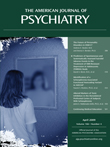To the Editor: In their article, published in the November 2008 issue of the
Journal, Kenneth S. Kendler, M.D., et al.
(1) examined the DSM’s diagnostic distinction between bereavement-triggered depression and depression related to other stressful life events. “Uncomplicated” bereavement-triggered depression (i.e., not too lengthy and not including certain severe symptoms-otherwise, it is “complicated”) that satisfies DSM major depressive disorder symptom criteria is excluded from major depressive disorder diagnosis, whereas other-stressor-triggered uncomplicated episodes are considered major depressive disorder. Dr. Kendler et al., using a different sample and different statistical techniques, replicated our finding
(2) that uncomplicated depressions triggered by bereavement and those triggered by other stressors are quite similar, and thus there are no empirical grounds that justify singling out only bereavement-triggered uncomplicated depression as normal.
Based on these findings, Dr. Kendler et al. suggested eliminating the bereavement exclusion for depression altogether, whereas we suggested extending the exclusion to other loss-triggered-uncomplicated depression. Dr. Kendler et al. further asserted that neither study “provides direct empirical information relevant to this challenging question” (
1, p. 1454) of eliminating versus expanding the bereavement exclusion. Their point was that the sheer similarity of uncomplicated bereavement-triggered and other-loss-triggered depression does not indicate whether uncomplicated-triggered depression overall is similar to or different from other major depressive disorder.
However, their assertion ignores an additional and central part of our previous analysis
(2) . In addition to comparing uncomplicated trigger types, we also compared types of uncomplicated depression with types of complicated-triggered depression. We found large differences between uncomplicated- and complicated-triggered depression on virtually all pathology indicators, therefore supporting the validity of the distinction. Consequently, we did provide empirical evidence relevant to elimination versus extension. Our recommendation to extend the bereavement exclusion to other loss-triggered depression rested on the combination of a powerful main effect of the complicated symptoms criterion on pathology indicators and the lack of an interaction effect between complicatedness and trigger type.
As a result of limitations to their regression analyses, Dr. Kendler et al. could not address the issue of elimination versus expansion. Although they found no interaction between trigger type and complicatedness, they did not test the main effect of complicatedness. In order to fully perform such a test using regression, two steps are required
(3) . The first considers only the main effects of the independent variables, and the second introduces the interaction term. The main effects are determined by the results of the first step, since in the second step the values of these effects are conditional on the interaction. In contrast, the interaction effect is determined from the results of the second step. Although Dr. Kendler et al. stated that they would follow this standard analytical path, they did not report a test concerning the unconditional main effect of complicatedness across triggers and thus provided no evidence pertaining to whether uncomplicated-triggered conditions are different from other depression on pathology indicators.

